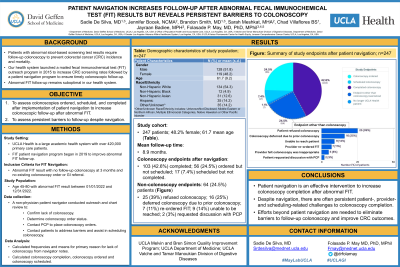Monday Poster Session
Category: Colorectal Cancer Prevention
P1768 - Patient Navigation Increases Follow-Up After Abnormal Fecal Immunochemical Test (FIT) Results but Reveals Persistent Barriers to Colonoscopy
Monday, October 23, 2023
10:30 AM - 4:15 PM PT
Location: Exhibit Hall

Has Audio
- SD
Sadie De Silva, MD
UCLA Health
Los Angeles, California
Presenting Author(s)
Sadie De Silva, MD1, Jennifer Bocek, NCMA2, Brandon Smith, MD1, Sarah Meshkat, MHA2, Chad Villaflores, MS1, Jayraan Badiee, MPH3, Folasade P.. May, MD, PhD, MPhil1
1UCLA Health, Los Angeles, CA; 2UCLA Office of Population Health and Accountable Care, Los Angeles, CA; 3University of California, Los Angeles, Los Angeles, CA
Introduction: Patients with an abnormal stool-based screening test result require follow-up colonoscopy to prevent colorectal cancer (CRC) incidence and mortality. Our health system launched a mailed fecal immunochemical test (FIT) outreach program in 2015 to increase CRC screening rates, followed by a patient navigation program to ensure timely colonoscopic follow-up. The non-physician patient navigator conducted outreach with patients who lacked colonoscopy 3 months after abnormal FIT and their ordering primary care providers (PCPs). In this analysis, we assessed persistent barriers to colonoscopy completion despite navigation.
Methods: We conducted a retrospective analysis of UCLA Health patients: 1) age 45 to 80, 2) with an abnormal FIT result between 01/01/2022 and 12/31/2022, 3) no existing colonoscopy order or gastroenterology referral, and 4) no follow-up colonoscopy at 3 months. Each month, we performed a query of the electronic health record for patients meeting these criteria and one patient navigator conducted a chart review to 1) confirm lack of colonoscopy, 2) determine colonoscopy order status, 2) contact PCP to place colonoscopy orders (if needed), and 3) contact patients to address barriers and assist in scheduling colonoscopy (if needed). For patients that did not complete colonoscopy, we tabulated the primary reason for lack of colonoscopy from patient navigator notes.
Results: The patient cohort included 247 patients. Mean follow-up time was 8.9 months. Patients were 48.2% females and the mean age was 61.7 (sd=9.2) (Table). Overall, 103 patients (42.6%) completed colonoscopy after navigation. Fifty-six (24.5%) patients had a colonoscopy ordered but not scheduled and 17 (7.4%) had a colonoscopy scheduled but not completed. Seven patients (1.1%) were no longer with UCLA Health. There were 64 (24.5%) patients who reached an endpoint other than colonoscopy (Figure); Of note, 25 (39%) of these patients refused colonoscopy, and 16 (25%) had colonoscopy deferred due to prior colonoscopy.
Discussion: Patient navigation is an effective intervention to increase colonoscopy completion after abnormal FIT. However, there are often persistent patient-, provider-, and scheduling-related challenges to colonoscopy despite navigation. Efforts beyond patient navigation are needed to eliminate barriers to follow-up colonoscopy and improve CRC outcomes.

Disclosures:
Sadie De Silva, MD1, Jennifer Bocek, NCMA2, Brandon Smith, MD1, Sarah Meshkat, MHA2, Chad Villaflores, MS1, Jayraan Badiee, MPH3, Folasade P.. May, MD, PhD, MPhil1. P1768 - Patient Navigation Increases Follow-Up After Abnormal Fecal Immunochemical Test (FIT) Results but Reveals Persistent Barriers to Colonoscopy, ACG 2023 Annual Scientific Meeting Abstracts. Vancouver, BC, Canada: American College of Gastroenterology.
1UCLA Health, Los Angeles, CA; 2UCLA Office of Population Health and Accountable Care, Los Angeles, CA; 3University of California, Los Angeles, Los Angeles, CA
Introduction: Patients with an abnormal stool-based screening test result require follow-up colonoscopy to prevent colorectal cancer (CRC) incidence and mortality. Our health system launched a mailed fecal immunochemical test (FIT) outreach program in 2015 to increase CRC screening rates, followed by a patient navigation program to ensure timely colonoscopic follow-up. The non-physician patient navigator conducted outreach with patients who lacked colonoscopy 3 months after abnormal FIT and their ordering primary care providers (PCPs). In this analysis, we assessed persistent barriers to colonoscopy completion despite navigation.
Methods: We conducted a retrospective analysis of UCLA Health patients: 1) age 45 to 80, 2) with an abnormal FIT result between 01/01/2022 and 12/31/2022, 3) no existing colonoscopy order or gastroenterology referral, and 4) no follow-up colonoscopy at 3 months. Each month, we performed a query of the electronic health record for patients meeting these criteria and one patient navigator conducted a chart review to 1) confirm lack of colonoscopy, 2) determine colonoscopy order status, 2) contact PCP to place colonoscopy orders (if needed), and 3) contact patients to address barriers and assist in scheduling colonoscopy (if needed). For patients that did not complete colonoscopy, we tabulated the primary reason for lack of colonoscopy from patient navigator notes.
Results: The patient cohort included 247 patients. Mean follow-up time was 8.9 months. Patients were 48.2% females and the mean age was 61.7 (sd=9.2) (Table). Overall, 103 patients (42.6%) completed colonoscopy after navigation. Fifty-six (24.5%) patients had a colonoscopy ordered but not scheduled and 17 (7.4%) had a colonoscopy scheduled but not completed. Seven patients (1.1%) were no longer with UCLA Health. There were 64 (24.5%) patients who reached an endpoint other than colonoscopy (Figure); Of note, 25 (39%) of these patients refused colonoscopy, and 16 (25%) had colonoscopy deferred due to prior colonoscopy.
Discussion: Patient navigation is an effective intervention to increase colonoscopy completion after abnormal FIT. However, there are often persistent patient-, provider-, and scheduling-related challenges to colonoscopy despite navigation. Efforts beyond patient navigation are needed to eliminate barriers to follow-up colonoscopy and improve CRC outcomes.

Figure: Figure: Summary of study endpoints after patient navigation; n=247
Disclosures:
Sadie De Silva indicated no relevant financial relationships.
Jennifer Bocek indicated no relevant financial relationships.
Brandon Smith indicated no relevant financial relationships.
Sarah Meshkat indicated no relevant financial relationships.
Chad Villaflores indicated no relevant financial relationships.
Jayraan Badiee indicated no relevant financial relationships.
Folasade May: Exact Sciences – Consultant, Grant/Research Support. Freenome – Consultant. Geneoscopy – Consultant.
Sadie De Silva, MD1, Jennifer Bocek, NCMA2, Brandon Smith, MD1, Sarah Meshkat, MHA2, Chad Villaflores, MS1, Jayraan Badiee, MPH3, Folasade P.. May, MD, PhD, MPhil1. P1768 - Patient Navigation Increases Follow-Up After Abnormal Fecal Immunochemical Test (FIT) Results but Reveals Persistent Barriers to Colonoscopy, ACG 2023 Annual Scientific Meeting Abstracts. Vancouver, BC, Canada: American College of Gastroenterology.
